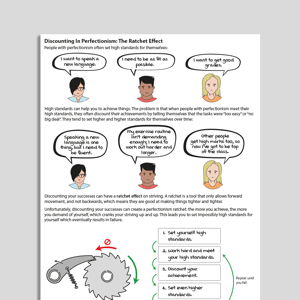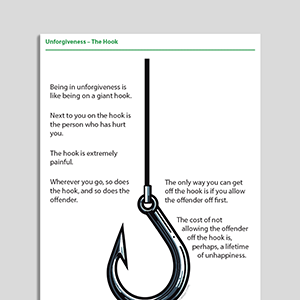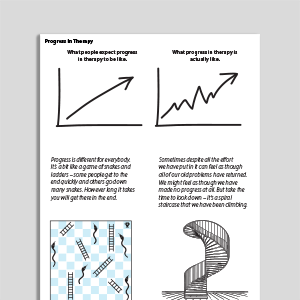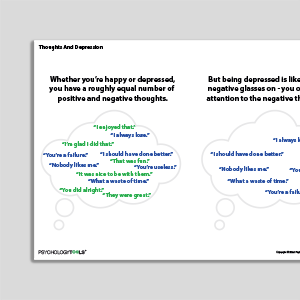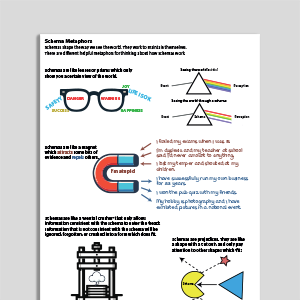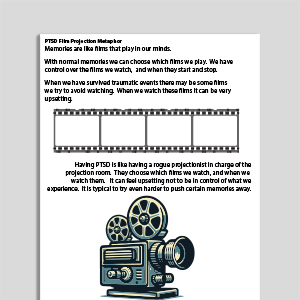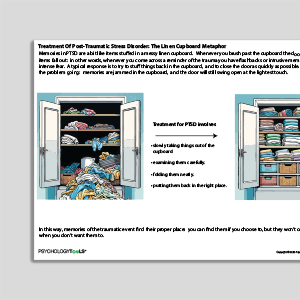Metaphor
Metaphor is defined as a device of speech in which comparison is drawn between two unlike entities. When drawn into a coherent story, metaphor can be used to deliver implicit messages in accessible ways, and throughout history metaphors have been used to impart cultural wisdom, life lessons, political messages, and moral values. In understanding the structure and function of metaphor the work of Lakoff and Johnson (1980a, 1980b, 1980c) is influential. They argue that concepts are tied to metaphors and that they mold our thinking. Complex abstract concepts such as ‘life’ can be tied to more concrete representations in a metaphor like ‘life is a journey’—Lakoff and Johnson propose that we understand complex concepts through the use of metaphor.
Showing 1 to 7 of 7 results
PTSD Film Projection Metaphor
PTSD Film Projection Metaphor
PTSD Linen Cupboard Metaphor
PTSD Linen Cupboard Metaphor
Links to external resources
Psychology Tools makes every effort to check external links and review their content. However, we are not responsible for the quality or content of external links and cannot guarantee that these links will work all of the time.
Information Handouts
- ACT tug-of-war metaphor script thirdwavepsychotherapy.net archive.org | Coleman, S. | 2015
Information (Professional)
- Compendium Of Acceptance And Commitment Therapy Metaphors | Colleen Ehrnstrom | 2011
Presentations
- Mastering the metaphor | Colleen Ehrnstrom | 2011
- The use of metaphor in therapy | Jonathan Lloyd
Treatment Guide
- ACT in a nutshell metaphor
Recommended Reading
- Stott, R., Mansell, W., Salkovskis, P., Lavender, A., & Cartwright-Hatton, S. (2010). Oxford guide to metaphors in CBT: Building cognitive bridges. Oxford University Press.
- Witzum, E., Van Der Hart, O., Friedman, B. (1988). The use of metaphors in psychotherapy. Journal of Contemporary Psychotherapy onnovdhart.nl archive.org
What Is Metaphor?
Metaphor is an essential component of the art of psychotherapy and its use is more apparent in some branches than others. The noted psychiatrist and clinical hypnotherapist Milton Erickson is considered a master of the art of metaphor and was known for his ‘teaching tales’ which often imparted important messages by indirect means. There is a strong use of metaphor within the cognitive behavioral family of therapies. Beck describes a number of uses of metaphor in his 1979 Cognitive Therapy of Depression. The use of metaphor is perhaps described most succinctly in Oxford Guide to Metaphors in CBTin which the authors argue “The business of cognitive therapy is to transform meanings. What better way to achieve this than through a metaphor?” (Stott, Mansell, Salkovskis, Lavender, & Cartwright-Hatton, 2010).References
Beck, A. T., Rush, A. J., Shaw, B. F., & Emery, G. (1979). Cognitive therapy of depression. New York: Guilford Press.
Lakoff, G., & Johnson, M. (1980a). Conceptual metaphor in everyday language. The Journal of Philosophy, 77(8), 453–486.
Lakoff, G., & Johnson, M. (1980b). The metaphorical structure of the human conceptual system. Cognitive Science, 4(2), 195–208.
Lakoff, G., & Johnson, M. (1980c). Metaphors we live by. Chicago: University of Chicago Press.
Stott, R., Mansell, W., Salkovskis, P., Lavender, A., & Cartwright-Hatton, S. (2010). Oxford guide to metaphors in CBT: Building cognitive bridges. New York: Oxford University Press.
